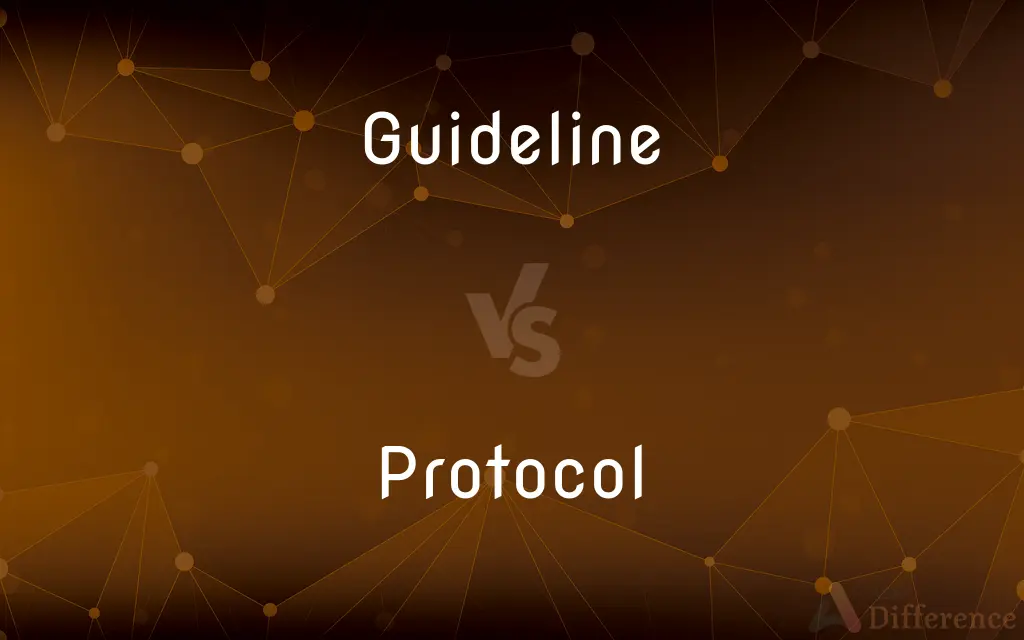Guideline vs. Protocol — What's the Difference?
Edited by Tayyaba Rehman — By Urooj Arif — Updated on April 16, 2024
Guidelines offer non-binding recommendations based on best practices, while protocols provide specific, binding procedures to be followed.

Difference Between Guideline and Protocol
Table of Contents
ADVERTISEMENT
Key Differences
Guidelines are typically advisory in nature, offering suggestions and best practice recommendations without enforcing compliance. Whereas protocols are structured, detailed procedures that are often mandatory, providing step-by-step instructions for specific situations.
Guidelines are generally broader, allowing for some degree of flexibility and professional judgment in their application. On the other hand, protocols are strict and are meant to ensure consistency and safety in practices, especially in fields like healthcare and information technology.
Guidelines are developed to guide decision-making in a variety of scenarios, often based on empirical evidence and expert consensus. Whereas protocols are usually based on regulatory standards or scientific evidence requiring strict adherence to achieve desired outcomes.
Guidelines aim to optimize processes by providing options that can be adapted to different circumstances. Conversely, protocols often minimize variability to ensure predictable and uniform outcomes.
Guidelines support professionals by providing a framework within which to operate, enhancing efficiency and effectiveness. In contrast, protocols often serve to minimize the risk of error and enhance accountability in critical procedures.
ADVERTISEMENT
Comparison Chart
Definition
Advisory recommendations based on best practices.
Specific procedures that are typically mandatory.
Flexibility
Offers flexibility and discretion in application.
Requires strict adherence with little flexibility.
Purpose
To guide decision-making and optimize processes.
To ensure consistency and safety in practices.
Nature
Non-binding and often based on consensus.
Binding and often based on regulatory standards.
Field of Usage
Broadly used across various fields.
Commonly used in fields requiring precision, like healthcare.
Compare with Definitions
Guideline
An advisory framework for action in various contexts.
Educational guidelines suggest two hours of homework per night.
Protocol
A detailed plan of a scientific experiment.
The clinical trial follows a strict protocol approved by the board.
Guideline
A recommended standard for best practices.
The building guidelines help ensure safety compliance.
Protocol
A code of behavior in formal settings or diplomatic interactions.
Protocol demands that diplomats dress formally for meetings.
Guideline
A suggestion designed to advise or guide actions.
The department issued new guidelines for remote work.
Protocol
A set of formal rules describing how to perform a specific task.
The lab protocol must be strictly followed to ensure safety.
Guideline
A document offering guidance on policies or procedures.
The company's employment guidelines were updated last year.
Protocol
A procedure or system for securing data in communication networks.
HTTPS is a protocol for secure communication over the internet.
Guideline
A guideline is a statement by which to determine a course of action. A guideline aims to streamline particular processes according to a set routine or sound practice.
Protocol
A method of treatment in medicine.
The treatment protocol for the disease includes several stages.
Guideline
A statement or other indication of policy or procedure by which to determine a course of action
Guidelines for the completion of tax returns.
Protocol
The official procedure or system of rules governing affairs of state or diplomatic occasions
Protocol forbids the prince from making any public statement in his defence
Guideline
A non-specific rule or principle that provides direction to action or behaviour.
He considered the Ten Commandments more as a guideline than a requirement.
Protocol
The original draft of a diplomatic document, especially of the terms of a treaty agreed to in conference and signed by the parties
Hungary and the Soviet Union signed a trade protocol
Signatories to the Montreal Protocol
Guideline
A plan or explanation to guide one in setting standards or determining a course of action.
Protocol
A formal or official record of scientific experimental observations
Protocols of published cases frequently lack this vital information
Guideline
A light line, used in lettering, to help align the text.
Protocol
A set of rules governing the exchange or transmission of data between devices.
Guideline
A formal rule describing how a situation must be handled; - used as a direction to administrators from superiors.
Protocol
The forms of ceremony and etiquette observed by diplomats and heads of state.
Guideline
A light line that is used in lettering to help align the letters
Protocol
A code of correct conduct
Safety protocols.
Academic protocol.
Guideline
A detailed plan or explanation to guide you in setting standards or determining a course of action;
The president said he had a road map for normalizing relations with Vietnam
Protocol
The first copy of a treaty or other such document before its ratification.
Guideline
A rule or principle that provides guidance to appropriate behavior
Protocol
A preliminary draft or record of a transaction.
Protocol
The plan for a course of medical treatment or for a scientific experiment.
Protocol
(Computers) A standard procedure for regulating data transmission between computers.
Protocol
To form or issue protocols.
Protocol
The minutes, or official record, of a negotiation or transaction; especially a document drawn up officially which forms the legal basis for subsequent agreements based on it.
Protocol
An official record of a diplomatic meeting or negotiation; later specifically, a draft document setting out agreements to be signed into force by a subsequent formal treaty.
Protocol
(international law) An amendment to an official treaty.
Protocol
The first leaf of a roll of papyrus, or the official mark typically found on such a page.
Protocol
The official formulas which appeared at the beginning or end of certain official documents such as charters, papal bulls etc.
Protocol
(sciences) The original notes of observations made during an experiment; also, the precise method for carrying out or reproducing a given experiment.
Protocol
The official rules and guidelines for heads of state and other dignitaries, governing accepted behaviour in relations with other diplomatic representatives or over affairs of state.
Protocol
An accepted code of conduct; acceptable behaviour in a given situation or group.
Protocol
(computing) A set of formal rules describing how to transmit or exchange data, especially across a network.
Protocol
(medicine) The set of instructions allowing a licensed medical professional to start, modify, or stop a medical or patient care order.
Protocol
To make a protocol of.
Protocol
To make or write protocols, or first drafts; to issue protocols.
Protocol
The original copy of any writing, as of a deed, treaty, dispatch, or other instrument.
Protocol
The minutes, or rough draught, of an instrument or transaction.
Protocol
A preliminary document upon the basis of which negotiations are carried on.
Protocol
To make a protocol of.
Protocol
To make or write protocols, or first draughts; to issue protocols.
Protocol
(computer science) rules determining the format and transmission of data
Protocol
Forms of ceremony and etiquette observed by diplomats and heads of state
Protocol
Code of correct conduct;
Safety protocols
Academic protocol
Common Curiosities
What is the main difference between a guideline and a protocol?
A guideline offers advice and suggestions, whereas a protocol lays down strict procedures.
Are protocols only used in scientific research?
No, protocols are used in various fields, including IT, healthcare, and diplomatic services, to ensure consistent and secure practices.
Why are protocols important in healthcare?
Protocols in healthcare ensure uniformity and safety in treatments and procedures.
Can a guideline be as detailed as a protocol?
Guidelines are less detailed than protocols and offer more flexibility.
Why might a business prefer guidelines over protocols?
Businesses might prefer guidelines for flexibility in adapting practices to their specific operational needs.
Can guidelines become mandatory like protocols?
Typically, guidelines are not mandatory; they are advisory, unlike protocols which are often compulsory.
How do guidelines assist professionals in their work?
Guidelines provide a framework and best practice recommendations that professionals can adapt based on the situation.
What are the consequences of not adhering to a protocol?
Failing to adhere to a protocol can lead to disciplinary actions, safety risks, and legal consequences.
Do guidelines apply to specific industries or sectors?
Guidelines can be applied across various sectors but are tailored to specific industries based on their needs.
What happens if someone fails to follow a guideline?
Since guidelines are not mandatory, not following them may not have legal repercussions but might lead to less optimal outcomes.
Who creates guidelines and protocols?
Guidelines are often created by professional bodies and expert groups, while protocols are formulated by authorities and regulatory bodies.
Is it possible to modify a protocol?
Protocols can be modified but usually require a formal review and approval process.
Share Your Discovery

Previous Comparison
Mitten vs. Kitten
Next Comparison
Virtuoso vs. ExpertAuthor Spotlight
Written by
Urooj ArifUrooj is a skilled content writer at Ask Difference, known for her exceptional ability to simplify complex topics into engaging and informative content. With a passion for research and a flair for clear, concise writing, she consistently delivers articles that resonate with our diverse audience.
Edited by
Tayyaba RehmanTayyaba Rehman is a distinguished writer, currently serving as a primary contributor to askdifference.com. As a researcher in semantics and etymology, Tayyaba's passion for the complexity of languages and their distinctions has found a perfect home on the platform. Tayyaba delves into the intricacies of language, distinguishing between commonly confused words and phrases, thereby providing clarity for readers worldwide.














































